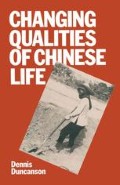Abstract
Since 1949 the quality of Chinese life has been shaped in the countries of the economic miracle principally by market forces and by the unplanned, at times random, action of all the individuals comprising a more or less ‘free’ society that embraces, save in Taiwan, alien races and ‘pluralistic’ cultures. In the People’s Republic, the style of government has been opposite in nearly every respect; the quality of the body of men set apart to exercise ‘the dictatorship of the proletariat’ (by force and unrestrained by laws), the Party cadres, have been the key factor in the changing, or the stagnant, quality of the people’s life. There are in any case eighteen million of them, outnumbering on one hand the population of Taiwan and on the other the Chinese inhabitants of Southeast Asia; in themselves, therefore, the cadres are one segment — one dare not say class — in the total quality of life; the major part of the stormy political drama since 1965 has been acted out on their smaller stage, with the masses onlookers or at most struggle-fodder.
‘A gentleman is not a tool’
(Analects of Confucius)
Access this chapter
Tax calculation will be finalised at checkout
Purchases are for personal use only
Preview
Unable to display preview. Download preview PDF.
Notes to Chapter Five: From Mandarin to Cadre
See especially the history of ‘Ten Mile Inn’ given by Isabel and David Crook, Mass Movement in a Chinese Village (London: Routledge & Kegan Paul, 1979).
Lucian W. Pye, The Spirit of Chinese Politics: a Psychocultural Study of the Crisis in Political Development (Cambridge, Mass.: M.I.T. Press, 1968).
See Robert J. Lifton, Thought Reform and the Psychology of Totalism —a Study of ‘Brainwashing’ in China (London: Gollancz, 1961), especially part 2: ‘Thought Reform of Chinese Intellectuals’.
Copyright information
© 1982 Dennis Duncanson
About this chapter
Cite this chapter
Duncanson, D. (1982). From Mandarin to Cadre. In: Changing Qualities of Chinese Life. Palgrave Macmillan, London. https://doi.org/10.1007/978-1-349-05803-7_5
Download citation
DOI: https://doi.org/10.1007/978-1-349-05803-7_5
Publisher Name: Palgrave Macmillan, London
Print ISBN: 978-1-349-05805-1
Online ISBN: 978-1-349-05803-7
eBook Packages: Palgrave History CollectionHistory (R0)

